Hello again, audio nerds! Welcome to the second installment. Lots to cover today.
First, it seems like the accompanying audio is a hit. However, it seems like reading the newsletter word-for-word is not. When I was recording the audio for Episode 1, it became clear that I speak very differently than how I write. There’s gap words. Intonation. Even with years of making concise business writing, it doesn’t matter. These are fundamentally different mediums. So my plan this week is to speak more off-the-cuff, and I’ll only loosely outline what I say. I want listeners to get as much or more out of the audio. So I’m sweetening the deal for you, dear listener. Today will also have a few music samples.
Second, in order to have future editions straight to your inbox (and not to Promotions/Spam), please add Audio-First as a contact. I hate seeing this “housekeeping item” in newsletters as much as you. So just do it now, ok? Thanks. Moving on.
Numbers on the board
Just how big is the AirPods phenomenon? I see varying estimates out there. Apple famously doesn’t give sales figures for nascent products, so there’s a lot of guesswork involved. But multiple sources say Apple will have sold at least 100M cumulative pairs by the end of 2019. I charted out one estimate from Loup Ventures below.
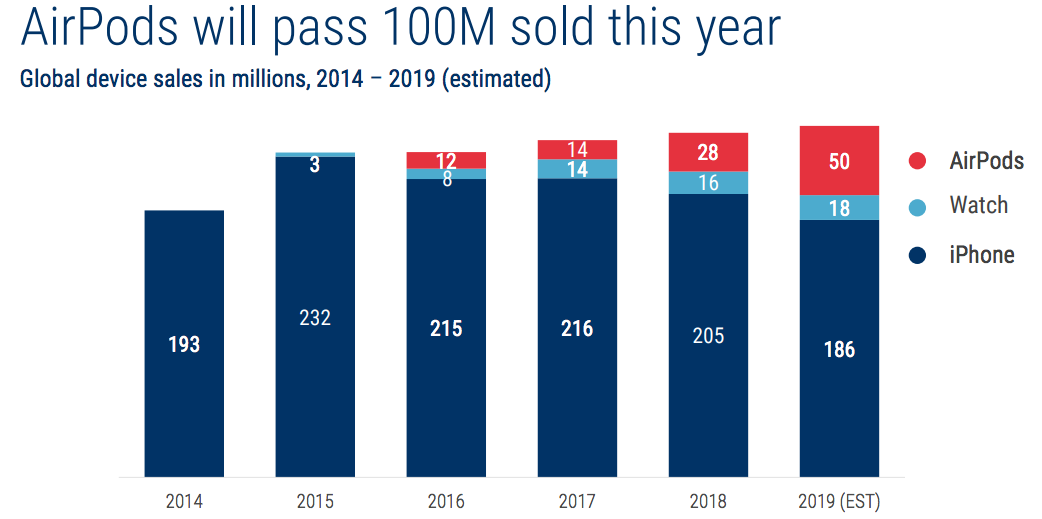
Clearly, it’s Apple’s fastest-growing product. The reality on the ground could be even higher than Loup is estimating. A report this week from Bloomberg said the surprise release of the AirPods Pro could put numbers as high as 60M sold this calendar year.
Elsewhere, I’ve seen more conservative estimates. Neil Cybart of Above Avalon says we’re only at around 61M cumulative pairs (excluding this coming quarter’s holiday sales, which would likely add another ~10M). Even with slightly conservative numbers, Cybart released a fascinating update this week that says AirPods are exactly on track with early iPhone sales post-launch. See below. You can barely see the AirPod line because it exactly follows iPhone curve.
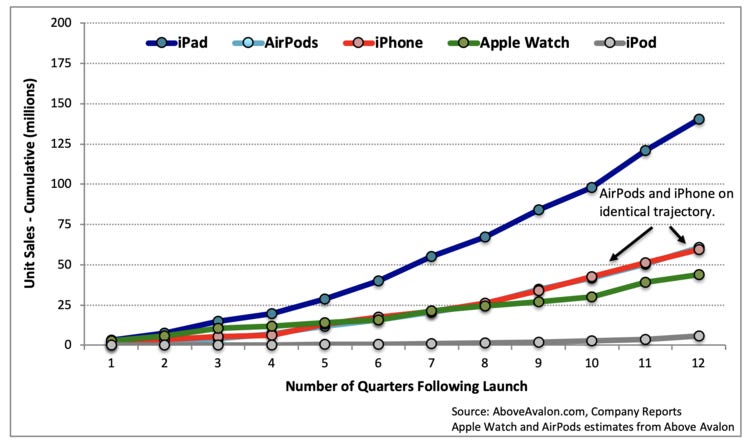
Here’s another look at solely the iPhone vs AirPods. It’s in lockstep.

Next month, the AirPods turn 3 years old. Besides being a nice round number, hitting 100M represents significant mainstream success. For perspective, the Amazon Echo hit 100M sold in January with just over 4 years on the market.
To risk sounding like a broken record, these numbers support the idea that AirPods are a platform shift. It’s getting easier and easier to imagine these ultra-small, ultra-portable headphones as an essential part of personal computing. As one entrepreneur wrote, “The watch as the de facto wearable was a red herring. The wrist is too far from the brain. AirPods.”
Let’s get musical, musical
With the decade coming to a close, I think about how music from this chapter will be remembered. In my mind, the two biggest stories were the rise of electronic and then hip-hop music, in all their variants.
Reflecting on my own listening, here’s roughly how it went down. In 2010 I was graduating from high school and synth-based music was everywhere. Kanye West’s 2008 album Graduation had incredible foresight into the electronic wave that was coming. Soon thereafter, synth-pop names like LCD Soundsystem, The XX, Passion Pit, Beach House, and MGMT were heard at parties, FIFA soundtracks, and in the festival circuit. Meanwhile, EDM was going mainstream, with 2011 marking “peak dubstep.” The data here isn’t perfect, but you can actually see it in the Google Trends data.

Meanwhile, on my college campus, weirder strains of synthpop were gaining steam. Chillwave, in particular, was on the rise around 2010-11. If you’re unfamiliar with chillwave, listen to the genre-defining songs Deadbeat Summer or Feel It All Around. At that time, the washed-out vocals and goopy synths captured the post-Recession zeitgeist. One critic called it “a sonic shoulder shrug, a languorous, musical 'whatevs'.” For me, it was front and center, albeit briefly.
Then suddenly, as my memory has it, a series of instant-classic hip-hop/RnB albums dropped and the whole world changed.
First, it was Kanye, then Kendrick, then Frank, then Beyonce, then Drake all in rapid succession. Only 5 years before, Nas declared hip-hop was dead. By 2012ish, it was the preeminent cultural force. I think most music nerds would agree these titans probably shaped popular music more than anyone else this past decade. And now that hip-hop/RnB is the #1 genre in America, I bet it’ll stay that way.
Interestingly, I’ve noticed recent hip-hop incorporating these early-2010 elements of chillwave, synth-pop, and neo-psychedelia. Recently, I came across a Pitchfork article titled ‘How Chillwave’s Brief Moment in the Sun Cast a Long Shadow Over the 2010s,’ which pored over this in detail:
Chillwave’s influence coursed through the veins of indie culture throughout the decade, especially as the “indie” descriptor came to be more associated with marketing than ethos...
The current prevalence of synth-pop—not rock—as indie’s central sound is owed greatly to chillwave’s sync-friendly style. There’s perhaps no better example of this decade-long transition than Tame Impala, who entered the ’10s as a zonked-out psych act and have since become master purveyors of glassy electronic pop that resembles an ultra-high-definition remaster of chillwave’s faux-analog aesthetic.
Beyond indie culture, Travis Scott—whose most recent album, Astroworld, represented a collision of goopy synths and chopped-up snippets of melody, like a screen-shattered iPhone—has essentially brought chillwave’s drippy energy to the center of hip-hop over the last few years. Meanwhile, a new generation of SoundCloud rappers continue to work by chillwave’s always-be-uploading creative ethos.
I completely agree with the sentiment. Hip-hop, I learned, has been repping chillwave for a while. Kanye and Diddy were reportedly early fans of Toro Y Moi. I think you can clearly hear chillwave’s trippy repetition in the beats of Playboi Carti’s ‘Long Time.’ Travis Scott has worked with Toro y Moi and recruited Tame Impala’s Kevin Parker, who’s easily the biggest name in psychedelic rock, for a song on Astroworld.
I’m tempted to make a grand thesis that hip-hop experienced its Sergeant Pepper’s moment. But it’s not exactly true. However, I think you can make the case that like electronic music, hip-hop is splintering into more varied and experimental sub-genres. As we enter the 2020s, I’ll be watching how these waves continue to bounce off each other.
Liner notes
Zuck wants you to pass the aux cord. How Charli XCX optimizes her music for streaming. Grimes thinks “live music is going to be obsolete soon.” Where “Yo Pierre, you wanna come out here?” is from. Ye and Jay showing Russell Crowe his shoutout on Watch The Throne. 22 musicians’ favorite albums of the decade. A request for industrial AirPod startups.
If you enjoyed this newsletter, forward it to a friend. If you didn’t, forward it to an enemy.
Stay tuned and keep it locked,
Nick
PS - I’m shooting to release an audio market map Thanksgiving weekend. Please send companies that might not be on my radar (ie not venture-backed) making a dent in the space. Again, Twitter DM is the best place to reach me.





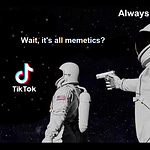
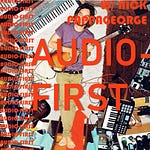
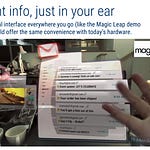
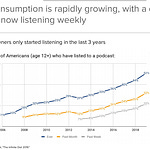
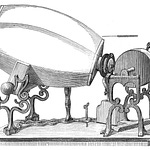
Audio-First #2: AirPods Sales, Chillwave, and Musical Trends of the '10s